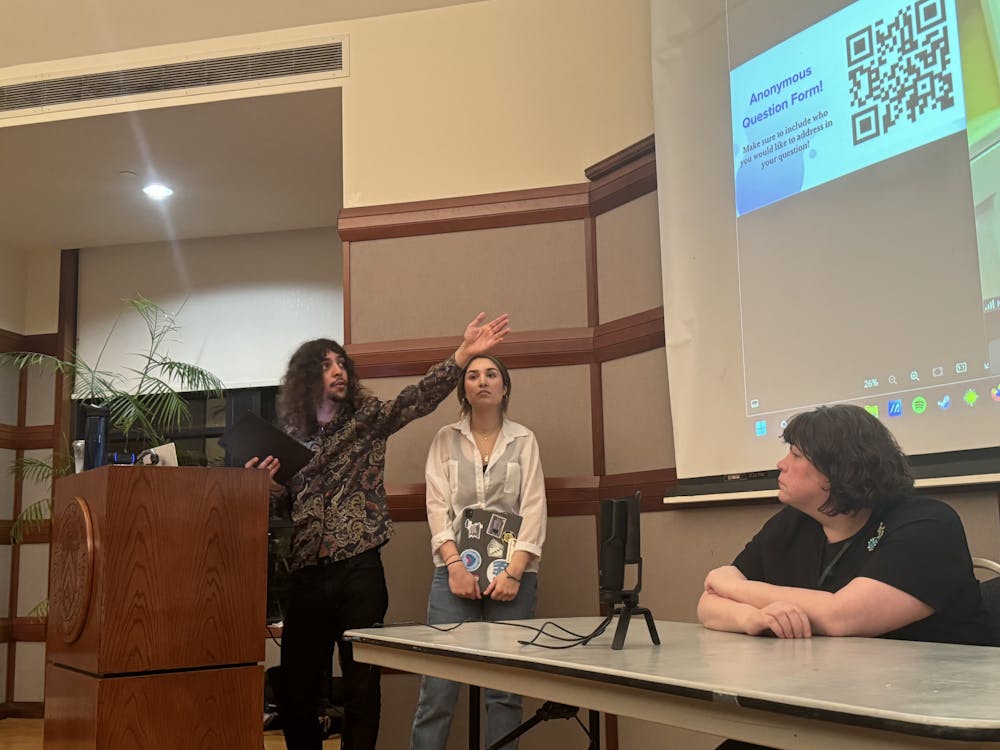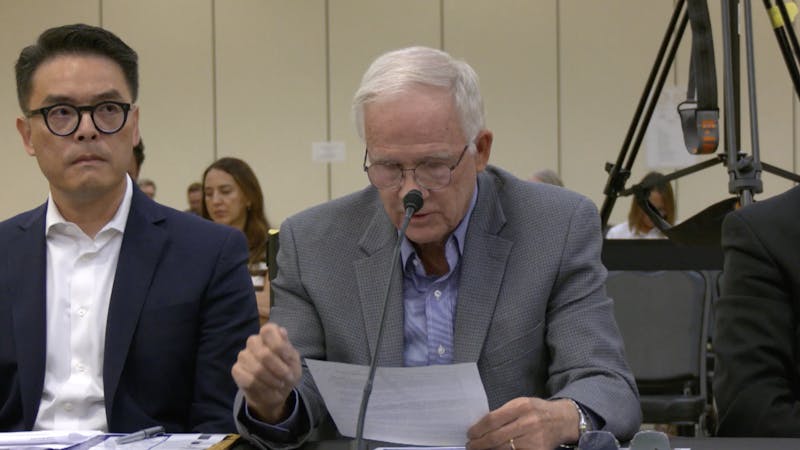Rice Owls Away Program pilot introduced following student advocacy

Maria Morkas / Thresher
Editor’s Note: Students interviewed were given the option of remaining anonymous in the interest of keeping their experiences private. The anonymous student was given false names, which have been marked with an asterisk on first mention.
Students Matti Haacke and Leela Sydow presented “A Critical Look into Mental Health Time Away at Rice” Jan. 22. They discussed students’ experiences with mental health crises, hospitalization, time away and return, and suggested improvements for the university system.
Allison Vogt, a panelist and associate dean of students, shared during the presentation that the university is launching the Rice Owls Away Program, a pilot initiative dedicated to helping students during their time away and return.
After Haacke and Sydow’s presentation, Vogt and Kimberly Blackshear, the director of the time away office at Duke University, shared insights from their experiences in the field.
Haacke and Sydow said their research included conversations with eight undergraduate students who had experienced mental health crises at Rice. According to them, students said there was a lack of communication about the policy for return after time away.
“It made it more emotionally [distressing] when [students] were already having really horrible mental health time, [and they were] being blindsided by things that they should have known from the beginning,” Sydow, a Jones College sophomore, said in an interview with the Thresher. “Directly misleading somebody saying, ‘Oh, you’re only going to be in here for seven days, no payments, full confidentiality’ — it’s so much more distressing when that turns out not to be true.”
As someone with ADHD, executive functioning issues and experiencing isolation due to the COVID-19 pandemic, Duncan College senior Sam* had a depressive episode during their freshman year that escalated into their sophomore fall.
“I decided to talk to my counselor at the counseling center,” Sam said. “I was at a breaking point, and I knew that I needed some sort of break … We discussed what hospitalization would look like, and I was assured that it wouldn’t necessarily be covered by Rice, but that it would be under my insurance … It wouldn’t be some giant expense.”
When they got to the emergency room, Sam said they were held for 24 hours in a blank room because Methodist did not have a bed and room available for them. Additionally, they were held for six days, when they originally thought it would have been two to three days.
“It cost my family around $5,000-6,000, which was a lot, and we definitely could not afford it,” Sam said. “When I came back, [Rice] told me, ‘There’s no choice where you’re allowed to come back full time; you can maybe come back part-time if we decide that you can. But we very, very, very strongly recommend that you withdraw for the semester.’”
Rice rejected Sam’s readmission paperwork, citing that they needed to see six months of stability first, something that Sam said was not initially communicated with them when they decided to withdraw. They weren’t allowed to come back until the following semester.
“My therapist described it as the equivalent of writing a legal, psychological assessment that would guarantee that I wouldn’t at [any] point ever be severely depressed again,” Sam said.“They [wanted a] guarantee that there wouldn’t be any sort of liability issue for them ever again … I eventually came back; they met with me once, and my well-being advisor didn’t show up [for the second meeting].”
Haacke, a Sid Richardson College junior, said that they noticed there was a lack of respect and agency for students who chose to take time off for their mental health. Students often didn’t feel a part of their own treatment plan, he said.
“Especially if they were hospitalized … the students feel like they’re kind of just put into the system and given steps of things they need to do, and don’t really have a choice on their own process of care,” Haacke told the Thresher. “[Similarly], students [don’t feel like] they have any autonomy, respect or that they’re being listened to when they express any concerns with the process about their own perceptions of their mental health.”
Vogt said that the Wellbeing Office has been making changes to the time away process. They have added resources for hospitalization and a director of case management, and they are further researching ways to support families. According to Vogt, ROAP administrators have reached out to eligible students about this new initiative.
“The program is in the pilot phase. We have invited students to participate and have had many responses,” Vogt wrote in an email to the Thresher. “The program will be implemented throughout the semester and participants will not only take advantage of the program but will also hopefully provide us with valuable feedback.”
Haacke said that it's important for the creation of a time-away office to have a level of autonomy, flexibility and institutional power.
“If [ROAP is] supposed to be a side support while you're on time away, it can be helpful,” Haacke said. “But if it's not the system of time away, it really can't succeed in the ways that we would want it to turn out to.”
Looking back, Sam said that they wished they had someone to walk them through the time away process — someone who knew exactly what needed to be done.
“I think it would be so amazing to have a [time away] office,” Sam said. “[The Wellbeing Office] is not dedicated to people who are taking time off; that's something that they have to do on the side. They have a lot of other things that they're responsible for.
“Ultimately, you end up on the backburner when you're taking time off,” they continued. “I think having someone dedicated to that would be so helpful, and someone who's intentionally on your side, trying to help you get back in, would make such a big difference.”
More from The Rice Thresher

Rice announces Chao College as 12th residential college
Rice announced that the 12th residential college will be named Ting Tsung and Wei Fong Chao College Aug. 19. The college, set to open in fall 2026, will contain nearly 300 on-campus beds.
Dining access fund announced following on-campus unlimited meal swipes
Rice announced new food assistance programs on Tuesday to account for the controversial change in the on-campus meal swipe plan.

Rice disaster prediction model discussed at hearing on deadly Central Texas floods
The House and Senate Select Committees on Disaster Preparedness and Flooding held a hearing on July 31 in Kerrville to address the deadly July 4 flooding in Central Texas. The flooding along the banks of the Guadalupe River killed 108 people, including 37 children. In the charged hearing, Texas lawmakers and flood survivors criticized the local response to the disaster.


Please note All comments are eligible for publication by The Rice Thresher.